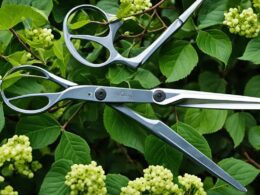Boiling water has been touted as a natural and eco-friendly method for killing weeds in your garden. But does it really work? Let’s find out.
Pouring boiling water over weeds may seem like a simple and effective solution to eliminate them. After all, the hot water can cause immediate damage and wilting to the above-ground part of the weed. However, experts suggest that boiling water may not be as effective as it appears.
While it can give the impression of killing the weed, many weeds have the ability to bounce back. They can recover by drawing resources from their root systems, allowing them to regrow. In order to completely kill a weed using boiling water, repeated applications over time are necessary to deplete the root system’s resources and eventually eliminate the weed.
It is important to note that pouring boiling water on weeds can also have unintended consequences. The heat can damage the roots of surrounding plants, potentially harming your desired plants in the process. Additionally, the hot water can kill beneficial microbes in the soil, disrupting the natural balance of your garden ecosystem.
So, while boiling water may have some initial effect on weeds, there are safer and more effective methods for weed control that you can explore. Let’s take a closer look at the limitations of boiling water as a weed-killing method and discover alternative solutions that are both effective and eco-friendly.
The Limitations of Boiling Water as a Weed-Killing Method
While pouring boiling water on weeds may seem like a convenient and cost-effective solution for effective weed control, there are several drawbacks to consider. Firstly, boiling water is only marginally effective in killing weeds because of their ability to recover from near-death. The damage caused by boiling water may appear to kill the plant, but the weed can potentially bounce back by drawing resources from its root system. This means that boiling water alone may not provide a long-term solution for weed eradication.
Repeated applications of boiling water can also have negative consequences. The intense heat can harm the roots of nearby plants, leading to significant damage or even death. This poses a risk not only to the weeds but also to the surrounding vegetation you wish to protect. Furthermore, boiling water can disrupt the delicate balance of soil microbes that are essential for plant growth and nutrient cycling. This disruption can have long-term consequences on the overall health of your garden or landscape.
Additionally, using boiling water for weed control comes with a safety hazard. There is a high risk of scalding oneself during the process, especially when handling large volumes of hot water. This can lead to painful burns and potential accidents, making it an unsafe method for both inexperienced gardeners and those with limited mobility.
Considering these limitations, it is advisable to explore alternative methods for effective weed control that are not only safer but also offer more reliable and long-lasting results. In the following section, we will discuss some of the recommended techniques and approaches to tackle weeds without relying on boiling water.
Safer and More Effective Weed Control Alternatives
Instead of relying on boiling water to control weeds, there are safer and more effective alternatives available. The most recommended method by gardening experts is manually pulling weeds. By grabbing the weed at its base and giving it a firm tug, you can remove the weed from its roots, ensuring it does not regrow. Using the right gardening gloves can provide protection while pulling weeds. For particularly stubborn or harmful weeds like Giant Hogweed, it may be necessary to seek professional help from environmental controllers.
Other alternative methods for weed control include digging and spraying with homemade weed killers. These methods offer a more targeted approach to weed eradication without the risk of damaging surrounding plants or the environment.
- Manually pulling weeds
- Digging
- Spraying with homemade weed killers
These methods allow you to selectively remove weeds without harming desirable plants. When manually pulling weeds, be sure to remove them from the root to prevent regrowth. Digging can be effective for deeper-rooted weeds or those growing in compacted soil. Homemade weed killers, made from ingredients like vinegar or salt, provide an eco-friendly alternative to toxic herbicides.
Implementing these safer and more effective weed control alternatives will help you maintain a weed-free garden without the potential risks associated with boiling water. By choosing these methods, you can protect your plants, promote a healthy environment, and enjoy a beautiful garden year-round.
Will Boiling Water Kill Weeds With Yellow Flowers?
Boiling water can effectively kill weeds with yellow flowers. This natural method is safe for the environment and doesn’t involve harmful chemicals. To ensure proper yellow flowers weed identification, it’s essential to correctly identify the plant before using any form of treatment.
Conclusion
While boiling water may initially seem like a simple and eco-friendly solution for weed control, it has limitations and potential drawbacks that make it less desirable. Although it can cause immediate wilting, many weeds have the ability to recover and continue growing, rendering boiling water ineffective in the long run.
Pouring boiling water on weeds also poses risks to the surrounding ecosystem. Not only can it harm neighboring plants, but it can also disrupt the balance of soil microbes essential for healthy plant growth. Moreover, the risk of scalding oneself with boiling water is a safety concern that cannot be overlooked.
Experts recommend adopting safer and more effective alternatives for weed control. Manual weed pulling, digging, and using homemade weed killers offer targeted approaches to eradicate weeds without the risk of causing harm to the environment or oneself. By considering these alternative methods, you can effectively control weeds while promoting a healthy and sustainable garden.









